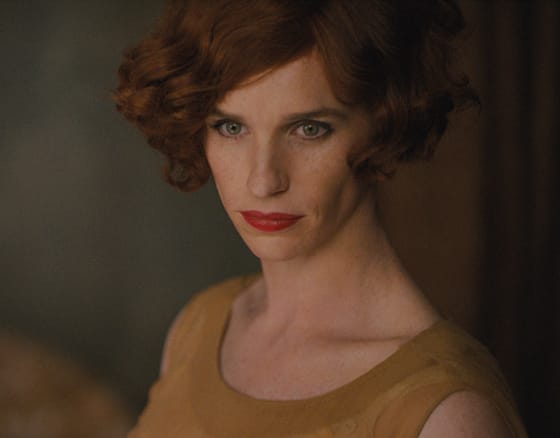In 1930, Lili Elbe began a physical transformation that would help break down barriers decades later by undergoing one of the first documented cases of sexual reassignment surgery. That journey — from self-discovery to transgender pioneer — is the subject of award-winning British filmmaker Tom Hooper's latest film, The Danish Girl.
Compared to the director's previous period pieces (more recently, The King's Speech and Les Misérables), The Danish Girl seems the most pared down, at least in terms of setting and the number of subjects touched upon.
Based on the 2000 book by David Ebershoff (itself an exaggerated dramatic depiction of its characters and the lives, both private and public, that they lead), the film concerns itself primarily with a romantically and emotionally entwined pair of painters, Einar (played by 2014 Academy Award-winner Eddie Redmayne) and Gerda Wegener (rising actress Alicia Vikander), both ahead of their time (Einar, for having the strength to transition in a time of great persecution; Gerda, for fighting for her artistic validity in an area still dominated by men).
Within moments of appearing on screen, it's clear that something is different about Einar. Subtlety and nuance are thrown out the door here, as Hooper frames shots of Redmayne's hands gliding gently across women's clothing, intently examining makeup and the female figure, both at home with Gerda and at the theatre, where he provides artistic backdrops for local productions. Things change when Einar sits in for an absentee female model one afternoon when Gerda is trying to work. It's almost as if the clothing they wear begins to consume them, and Einar's true self is revealed in the billowing dress.
From there, the viewer is privy to Einar and Gerda's struggle to accept the transition. Redmayne's portrayal of Lili is elegant, whether it's sharing a drink with friends or posing for Gerda in the comfort of their home. But there's something about Vikander, who seems more powerful than in any of her other previous performances as Lili's brazen love interest, that consistently steals the show. The shift in focus to Vikander's character and her own personal transformation and depth — from strong-willed but doting lover to confused confidant and, later, friend — is poignant and engaging.
Sadly, given the director and his performers' pedigrees, don't expect to see many awards nominations given out to anyone but the film's main leads. Lucinda Coxon's script relies a little too heavily on exposition when something subtle would do just fine (at one point, when Gerda retells her courtship to some friends, she says, "It was like kissing myself," and yes, it was as awkward to watch as that probably was to read), and, given Hooper's predilection for natural light, the film always feels a bit drab, visually.
At the end of the day though, The Danish Girl is an accessible and likeable film, and given the stigma still associated with the trans community, that's a good — and much-needed — thing.
(Universal)Compared to the director's previous period pieces (more recently, The King's Speech and Les Misérables), The Danish Girl seems the most pared down, at least in terms of setting and the number of subjects touched upon.
Based on the 2000 book by David Ebershoff (itself an exaggerated dramatic depiction of its characters and the lives, both private and public, that they lead), the film concerns itself primarily with a romantically and emotionally entwined pair of painters, Einar (played by 2014 Academy Award-winner Eddie Redmayne) and Gerda Wegener (rising actress Alicia Vikander), both ahead of their time (Einar, for having the strength to transition in a time of great persecution; Gerda, for fighting for her artistic validity in an area still dominated by men).
Within moments of appearing on screen, it's clear that something is different about Einar. Subtlety and nuance are thrown out the door here, as Hooper frames shots of Redmayne's hands gliding gently across women's clothing, intently examining makeup and the female figure, both at home with Gerda and at the theatre, where he provides artistic backdrops for local productions. Things change when Einar sits in for an absentee female model one afternoon when Gerda is trying to work. It's almost as if the clothing they wear begins to consume them, and Einar's true self is revealed in the billowing dress.
From there, the viewer is privy to Einar and Gerda's struggle to accept the transition. Redmayne's portrayal of Lili is elegant, whether it's sharing a drink with friends or posing for Gerda in the comfort of their home. But there's something about Vikander, who seems more powerful than in any of her other previous performances as Lili's brazen love interest, that consistently steals the show. The shift in focus to Vikander's character and her own personal transformation and depth — from strong-willed but doting lover to confused confidant and, later, friend — is poignant and engaging.
Sadly, given the director and his performers' pedigrees, don't expect to see many awards nominations given out to anyone but the film's main leads. Lucinda Coxon's script relies a little too heavily on exposition when something subtle would do just fine (at one point, when Gerda retells her courtship to some friends, she says, "It was like kissing myself," and yes, it was as awkward to watch as that probably was to read), and, given Hooper's predilection for natural light, the film always feels a bit drab, visually.
At the end of the day though, The Danish Girl is an accessible and likeable film, and given the stigma still associated with the trans community, that's a good — and much-needed — thing.
